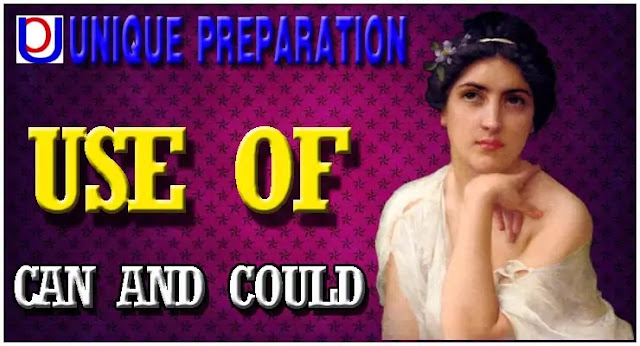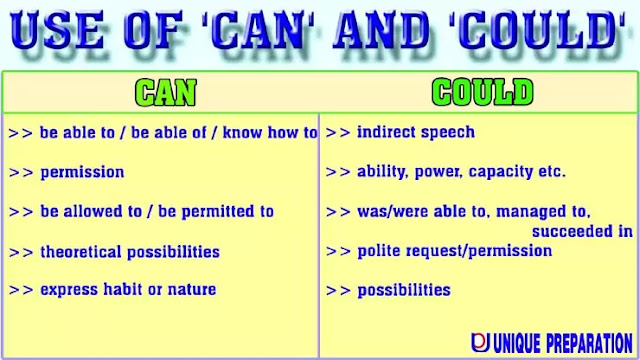USE OF 'CAN' AND 'COULD'
As we have already discussed about auxiliary verb, if you have not seen or read yet then (click here).
CAN
1. Can is a modal auxiliary verb. It is used in sentences to express 'power, ability and capacity'.
Ex.
- Ram can run faster than you.
- He can solve this question.
- My younger brother can speak English.
- I can break the stick.
be able to / be able of / know how to
2. I can defeat him in the contest.In the given above sentences 'can' consist the meaning 'be able to / be able of / know how to'.
Ex.
- Ram can run faster than you.
- Ram is able to run faster than you.
- Ram is capable of running faster than you.
- Ram knows how to run faster than you.
permission
3. Can is also used to express the 'permission'.
Ex.
- You can go now.
- You can take my pen.
- Can I use your book?
- Stop! you can't beat him.
be allowed to / be permitted to
In the above given sentences 'can' consist the meaning 'be allowed to / be permitted to'.
Ex.
- You can go now.
- You are allowed to go now.
- You are permitted to go now.
According to the grammar the use of 'can' is not considered correct in the sentence expressing permission. Therefore, you must use 'may' in place of can in such a sentences.
theoretical possibilities
3. Can is used to express 'theoretical possibilities'.
Ex.
- Everyone can make a mistake.
- News can't be true.
- Negligence on road can be dangerous.
express habit or nature
4. Can is used to 'express habit or nature'.
Ex.
COULD
indirect speech
1. Also, could is auxiliary verb. It is past tense form of can. It is used in the form of indirect speech.
Ex.
He said to me, "You can play with me." (Direct speech)
He told me that I could play with him. (Indirect speech)
They said, "You can face the problem." (Direct speech)
They said that I could face the problem. (Indirect speech)
ability, power, capacity etc.
2. Could is used to express ability, power, capacity etc. of past.
Ex.
- He could not drive a car due to rain.
- He could not write a letter.
- When he was teasing me, I could beat him.
In the all sentences given above 'could' has been used to express the ability haven't to complete the work.
was/were able to, managed to, succeeded in
The work to be completed or be executed is used 'was/were able to, managed to, succeeded in'.
Ex.
- He could pass the examination.
- He was able to pass the examination.
- He passed the examinaton.
- He managed to pas the examination.
- He succeeded in passing the examination.
polite request/permission
3. Could is used to express the 'polite request/permission' in interrogative sentence.
Ex.
- Could you help him, please?
- Could I sit here?
- Could I use your pen?
- Could you, please pass the plate?
To express 'polite request/permission' the use of could is better than use of can and may.
possibilities
4. Could is used to express the 'possibilities' in present tense of unreal situation sentence.
Ex.
- If you had patience, you could succeed in business.
- If he worked hard, he could succeed.
Exercise for practice
Use Can or Could in the following blanks.
- You ..........................speak Hindi.
- She said that she ..................... do.
- I ............. swim across the river.
- He ...................... write what he can.
- .......................you lift this book?
- I ..................... swim across the river when I way young.
- She ..........................sing a song.
- I ................. concentrate for longer hours when I was younger.
- anyone ...................... join the club.
- My grandfather ..................... walk on his legs.
- ................... you help me?
- He said that I .......................... go.
- He ........................ could buy a coat.
- You ........................ go home now.
- He .................... solve this sum.
- ..................... I borrows your pen for a week.
- This .................. not be true.
- The deaf ............................... not hear.
- None ............................. challenge him.
- We .......................... not live without water.
- ..........................you do it?
- He ........................... could lift his load.
- He ......................... defeat his opponent.
- He said that he ..................... beat him at chess.
- You .......................... write an application to the Principal to condone.
Answer : 1. can 2. could 3. can
4. can 5. can 6. could
7. can 8. could 9. can
10. can 11. can 12. could
13. could 14. can 15. can
16. could 17. can 18. can
19. can 20. can 21. can
22. could 23. can 24. could
25. could
You can also read




0 Comments